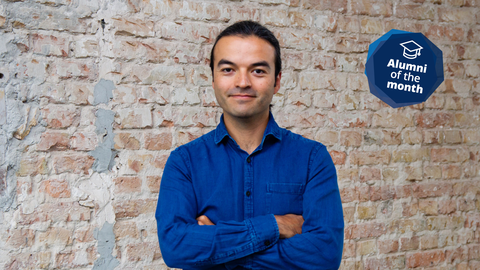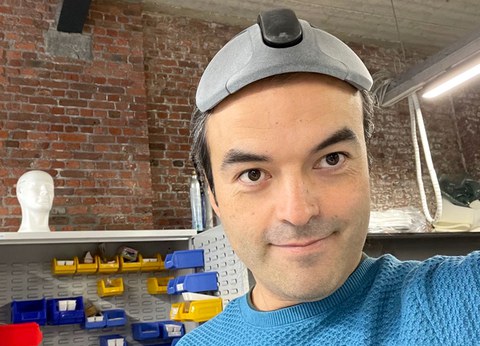The biomedical scientist Dr. Carlos Chacón Martínez in conversation
"Give Me Five+!" - And discover what you always wanted to know about our TUD Alumni. We asked them to share, in our new “2 x 5 Questions” format, how they came to TUD, their experiences on campus, and where/with what responsibilities they currently work. Today: Carlos Chacón Martínez, CEO and founder of Niostem.
| Profile of | Carlos Chacón Martínez |
| Degree program | PhD in cell biology (regenerative medicine program) |
| Faculty | Medical Faculty, MTZ |
| Study time | Nov 2007 - April 2012 |
| Current activity | CEO and co-founder of Niostem |

Dr. Carlos Chacón Martínez is the April 2023 Alumnus of the Month.
Why did you decide to study at TU Dresden?
The TU Dresden has a world-class hub for biomedical basic and applied research encompassing the university itself (natural sciences and medical faculty) and renowned institutes such as the Max Planck Institute CBG, the CRTD, MTZ, Biotec (Biotechnology Center of the TU Dresden), University Hospital Carl Gustav Carus Dresden, just to mention a few. Equally important, these institutions work together and synergise interdisciplinary research at the highest level. The Professors are world-wide renown, PhD programs like the DIPP attract excellent talent and the infrastructure and facilities are one of the best in Germany. All these make the TU Dresden and Desden itself a must-be place for biomedical research in the world. Having done my PhD there was a privilege.
What factors drove you to choose your field of study?
I always wanted to have a direct impact on people with what I do, I like to help people solve problems. I fell in love with Biotechnology and medical sciences as that has a huge impact on people's health and quality of life. Biological sciences and regenerative medicine are fundamental to understand, develop and solve health and wellbeing issues, thus a career in these fields has been rewarding for me. Right now I’m in the privileged position that I can bring my research into a real product with the Startup I founded, Niostem.
Who from research and teaching influenced you the most during your studies?
The biggest influence was doctoral father, Prof Dr Rolf Jessberger. Rolf is an amazing human being and a brilliant scientist. He taught me so much by giving enough freedom, guidance and support to pursue my curiosity, to develop and challenge my ideas, that as a researcher I’m privileged to have had such a fantastic mentor. Also the people from the Jessberger lab and neighbouring labs all influence my research and my personal growth, from Professors to technical assistants, postdocs and fellow PhD students, all that diversity of people made my time at the TU Dresden one of the best times in my life.
Where are you employed today, and with what responsibilities?
Four years ago I founded my own Startup, Niostem, after finishing my postdoctoral research at the Max Planck Institute for Biology of Ageing in Cologne, Germany, which I pursued after my PhD. Niostem is using regenerative, wearable technologies to solve common hair loss. My responsibilities as CEO of Niostem, which is a venture-funded tech Startup in Cologne, include building and leading a team of talented people including professions ranging from engineers and designers to marketing and business. I’m also responsible for the scientific and product development at Niostem and keeping the company afloat.

With his team, Dr. Martinez develops wearable technologies to address widespread hair loss.
What advice would you give to today's first-year students?
To first year PhD students I’d advise them to be very open, communicative, collegial and adventurous as these will contribute making your science and research much better and meaningful. Also take every opportunity you have to network, talk to lay people and interact with people in other disciplines different than yours; learn to work in teams and enjoy diversity.
What do you remember most fondly from your student days?
As a PhD student of the international PhD program, what I remember more candidly is the social and scientific interactions with my fellow students but also across the campus. In science, it felt like there were no barriers in what I could do in my research as there was always someone in the campus with the knowledge or equipment or connections I needed, I just had to ask for them, in a very informal and collegial manner. That’s amazing for science. From the social point of view, I loved the diversity and all the activities I did with my lab mates and all the people in the campus e.g. I love the “Bioolympics'', which were kinda Olympic games among institutes, or the Friday beer hours at the MTZ, MPI CBG, Biotec or CRTD. Those were great moments to get to know people, many of which I’m still in contact with after almost 10 years! Great family feeling.
Where was your favorite place at university?
The University Hospital Carl Gustav Carus and its many nice places for walking and chilling out, specially the MTZ (Medizinisch-Theoretisches Zentrum) and surroundings.
What do you still benefit from today/would you have liked more?
100% from the network I built during my 5 years at the TU Dresden from fellow students to Professors. I’m still in contact with my doctoral father and mentor!
How do you manage a good career start in your industry?
After a PhD in biological sciences there are many possibilities from academia and research to writing or founding your own Startup! I believe that not everybody should wait to get into “industry” but rather create an industry, create innovation, and disrupt the status quo. It is better to have a start than only thinking of a “good start”, as a recent graduate you need to think what makes you happy, what fulfils your aspirations, then set goals, make a plan on how to get there and execute. Execution is the most important because wishing good isn’t anything without working hard for it.
What connects you with the TU Dresden today?
I’m still in contact with my PhD father and mentor. Similarly, many people I know still work at the University or in Dresden. In other words, people, they are the most valuable asset the university can offer.
Contact:
